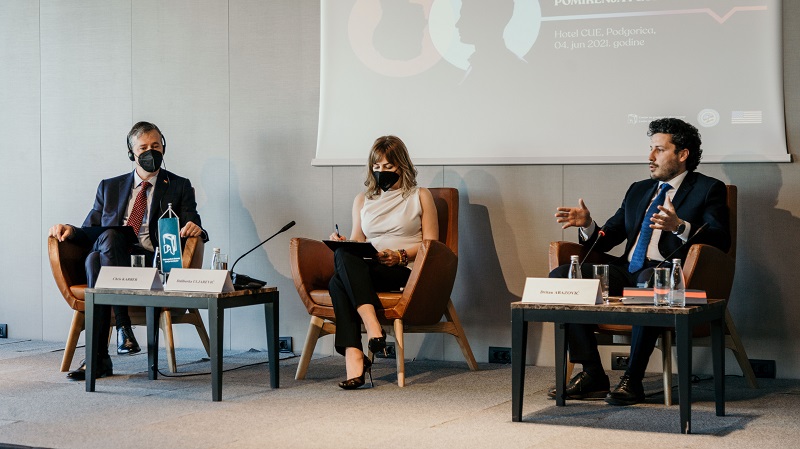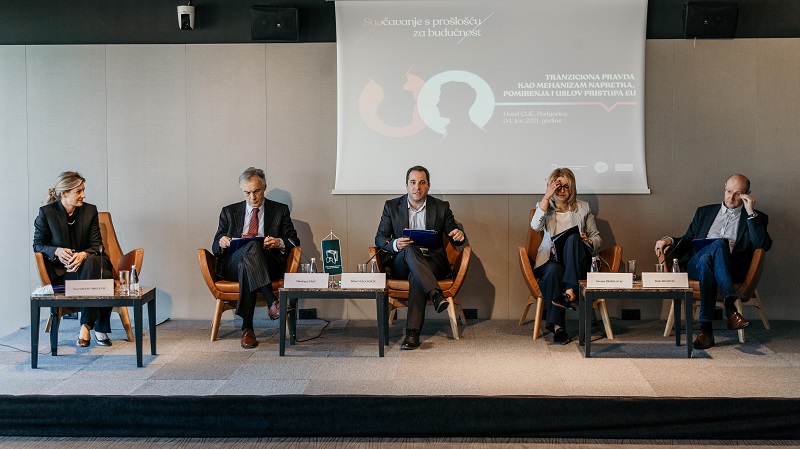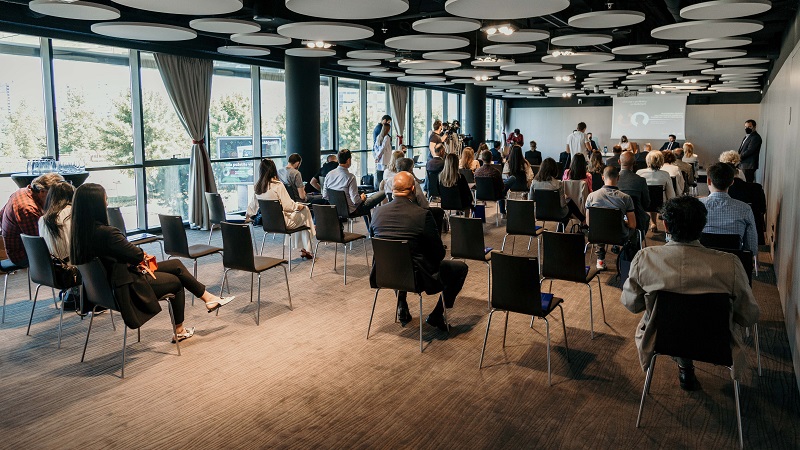It is time for the new approach to transitional justice in Montenegro, i.e. shaping transitional justice which will not be selective, deficient, limited by political interest, or the lack of vision. That approach must be in harmony with proclaimed principles of civil equality and the Montenegrin Constitution, because we cannot build a society without thorough and overall transitional justice, as noted at today’s conference “Transitional justice as a mechanism of progress, reconciliation and condition of the EU accession”, which the Centre for Civic Education (CCE) organized with the support of the U.S. Embassy.
Dritan Abazović, Deputy Prime Minister of Montenegro, highlighted the importance of active and continuous work of the civil sector in the area of dealing with the past. “So far, we have had transitional injustice. We are a society that likes to turn a blind eye to problems, we do not deal with the key issues, and the question of war crimes is important for our future and it should be seriously addressed. Today’s participation of the Government may mean that some other course will be imposed in the coming period, but that also largely depends on the prosecutorial and judicial institutions,” he claimed. Abazovic emphasized that “war crimes do not render obsolete, but we must be aware of devastating facts – there are no adequate epilogues when it comes to the war crimes. That discourse should be fixed because it is obvious that judicial, political, legislative, executive power avoid this issue”. His position is that that there is no progress on the path towards the EU without essential steps. “Two chapters address war crimes and citizens who support membership must know that we cannot make success or have efficient integration path without solving these issues”, stated Abazović. He claimed that the new Government will not have epochal steps forward, but that change was needed for starting the democratic wheel which was stuck. “I think that political monopolies do not exist anymore, that everyone is important in its way and I consider that this will continue in the future election cycles. Montenegro should not live in the 90s, it must step out, and one of the steps is definitely launching the procedure for dismissal of the Minister of Justice”, he said when asked about the potentials and capacity of the new Government to establish transitional justice.
Chris Karber, U.S. Embassy Charge d’Affaires, reminded that the U.S. Embassy helps Montenegro build a more efficient criminal system and strengthen the rule of law, which is essential for the country which strives for EU accession, emphasizing the key role of the NGOs in strengthening the rule of law. ”The U.S. Embassy has supported the process of reconciliation through a wide spectre of activities that aimed at capacity building of the judges and prosecutors to identify, investigate and prosecute war crimes. Further, we hired experts from the USA and Hague Tribunal and organized study visits of judges and prosecutors to international institutions”, he explained. “Recognition of crimes from the past as they were, including, for example – the Srebrenica genocide, is extremely important. We can have progress only when we acknowledge the past and learn from it”, said Karber.
Daliborka Uljarević, Executive director of the CCE, pointed out the potential, but also the obligation which brings the establishment of transitional justice for the overall democratic transformation and construction of the society of justice, with reference to the assessments of the latest Non-paper for Chapters 23 and 24. “Hence, the EC has sent a clear message when it comes to dealing with the past and war crimes, which should be a wake-up call for MPs and those in the Government who are still ready to support minister Leposavić, but also for those who claim that they are wholeheartedly for the process of Europeanization but do not want to vote for the Resolution about Srebrenica“, she noted. „The very systematic neutralization of these issues in the previous period is coming back to us today, through various unpleasant and dangerous aspects. Therefore, awareness of decision-makers that transitional justice must not be subject to political manipulation is essential. Dealing with the past in itself is complex and challenging enough to be burdened with discussions about final court verdicts, scientifically determined facts and in the end, generally accepted civilization norms”, she concluded.
Miodrag Lekić, Chairperson of the Committee on International Relations and Emigrants and a member of the Committee on Human Rights and Freedoms, from Parliamentary Club of Peace is our nation (DEMOS), considers that “culture of remembrance converts into the civil war of remembrance”. He pointed out deficiencies of both democratic traditions and the present of Montenegro, emphasizing that “dealing with the past represents an issue essential for government, state”. Lekić considers that our past is a deed of current manipulators and authorities, the project of the division of society with all the consequences that follow. “People of poor education felt the attraction of the past in terms of its practical value and there has been a huge ongoing manipulation, which points to the need of necessary shift of this aspect”. He underlined that the prior tasks are the improvement of economic system, blockade of judiciary and solution that sometimes seem to be unsatisfactorily solid. “Coexistence is mutual issues and these changes should avoid the perception of the zero point in history which cost us a lot. The commitment of this government will be measured by avoiding radicalism, accepting positive achievements of the past and their further valorisation in building the new society, with radical discontinuity with deformities”, he claimed. Reflecting on the draft Resolution on the Srebrenica genocide, he stated that “if the criteria are the verdict of the international court, there is no doubt that it was genocide. However, I was restrained because of certain formulations in the proposed resolution, with the intention to improve that content”, he explained.
Suzana Pribilović, member of Legislative committee and Parliamentary club of the Democratic party of socialists of Montenegro and the Liberal party of Montenegro – LPCG, reflected in detail on the recently published EP Resolution, expressing wonderment over formulations that characterize former government as autocratic, particularly concerning noted progress in negotiation even during the change of government. She expressed concern over the development of the situation regarding the Special State Prosecutor and non-adopting entire recommendations of the Venice Commission. “Amendments to the Law on State prosecution are undermining the constitutional order of the state. If we expect that the Acting Supreme State Prosecutor, who will be appointed by the Prosecutorial Council from any company, public institution with condition that he has passed State Exam, meet this challenge at full capacity, expectations that some significant results will be achieved in the field of transitional justice are unrealistic. Also, EC strongly condemned the denial of the Srebrenica genocide and the doubts expressed by the Minister of Justice, Human and Minority Rights regarding the verdicts and legitimacy of the Hague Tribunal, but also complimented on the Government’s prompt reactions.” She cited some statements of minister Vesna Bratić, assessing that these do not contribute to the affirmation of human rights and democratic principles. She also reflected upon the statement of the MP Strahinja Bulajić who claimed that the attitude of the minister of Justice, Mr Leposavić, on the Srebrenica genocide is shared by all the members of the coalition “For the future of Montenegro”, concluding that “all this supports the fact that the claims that the previous government was autocratic are not true. On the other hand, we could do more and better, but at the same time we cannot ignore the alarming state on the public scene that we have been witnessing since the constitution of the new government and non-supporting of the Resolution on Srebrenica genocide by the current parliamentary majority”.
Tea Gorjanc Prelević, Executive director of the Human Rights Action (HRA), notes that “justice for the victims of war crimes is tested for the rule of law which Montenegro must pass not only on the path towards European Union but also towards the establishment of a democratic, modern state. Unfortunately, it has not passed that test yet and we still have to worry about that”. She recalled a poor performance in proceeding with the war crimes. “Professional responsibility of prosecutors is questionable. In cases dealt with by the Prosecution since the 1990s, out of 37 accused even 27 were acquitted, out of 11 accused – 4 did not serve the sentences. Also, three war crimes are not even qualified as war crimes by Montenegrin courts. The EU expert criticized these verdicts in 2014, as well as the strategy of the Prosecution. In every EC report from 2013, this area was criticized as well as judgements of Montenegrin courts because of the wrong implementation of law, which is an important fact in comparative aspect as such harsh evaluations do not exist for any other verdict concerning organized crime, corruption, etc’’. Gorjanc Prelević characterized as problematic the fact that the Prosecution has not launched not even one investigation on its own in the last six years. “A huge problem is the responsibility of the state leadership for war crimes, where the case of Deportation of Refugees is particularly emphasized. The criminal charge against state leadership about Deportation was refused without explanation, which does not contribute to building trust in institutions and the country”, she said. She highlighted that the positive sides are reparations or compensations of damage which is adjudicated to a significant number of people, while on the other side there is the institute of obsolescence of demands for damage, which the Government should address. As one of the pillars in achieving transitional justice, she noted memorials largely supported by public opinion who consider that every crime scene should be commemorated.
Rade Bojović, Programme coordinator at Civic Initiative “21 May” thinks that this process will not be ended soon and that this issue is requesting a direct address. “No matter how important the responsibility of the judiciary is, its functionality, willingness of judges and prosecutors to proceed the most hideous cases is not possible within a political environment that denies all this, suppresses either for reasons related to personal responsibility from that time or a policy that dominates and creates such conditions that hinder someone’s engagement in processes that exclude opportunism, personal courage and confrontation to a dominant political opinion”. He considers that nobody regrets 30August and the fact that authority that did not confront these issues had lost the elections, but that instead of bad we got worse treatment – „government that runs away from these issues, which is indicated by political attitude toward initiatives about resolution, declaration prohibiting fascist groups, the Leposavić case…“ Bojović also assesses that „revisionism, relativism, avoiding the opening of these issues paralyses this society. This is not just a problem of this society; such issues are neglected in other countries as well and tried to be solved by declarative rhetoric. For Montenegrin political future, it would be the best that political actors who reflect the 90s and have not decided to get rid of the past completely, become the past themselves. Montenegro must find the strength to face its heritage. Montenegro is not without potential for such a scenario, but dominant political opinion still represents the obstacle. Of course, in cooperation with the international factors, there are more chances of getting out of burdens of the 90s“, highlighted Bojović.
The conference gathered around 50 representatives of the parliamentary majority and the opposition, academic community and civic sector, with respect to epidemiological measures.
The conference represents the final event of the project “Dealing with the past for the future”, which the Centre for Civic Education (CCE) is implementing with the financial support of the US Government, through the State Department Bureau for Combating International Drug Trafficking and Law Enforcement (INL).
Maja Marinović, Programme Associate



